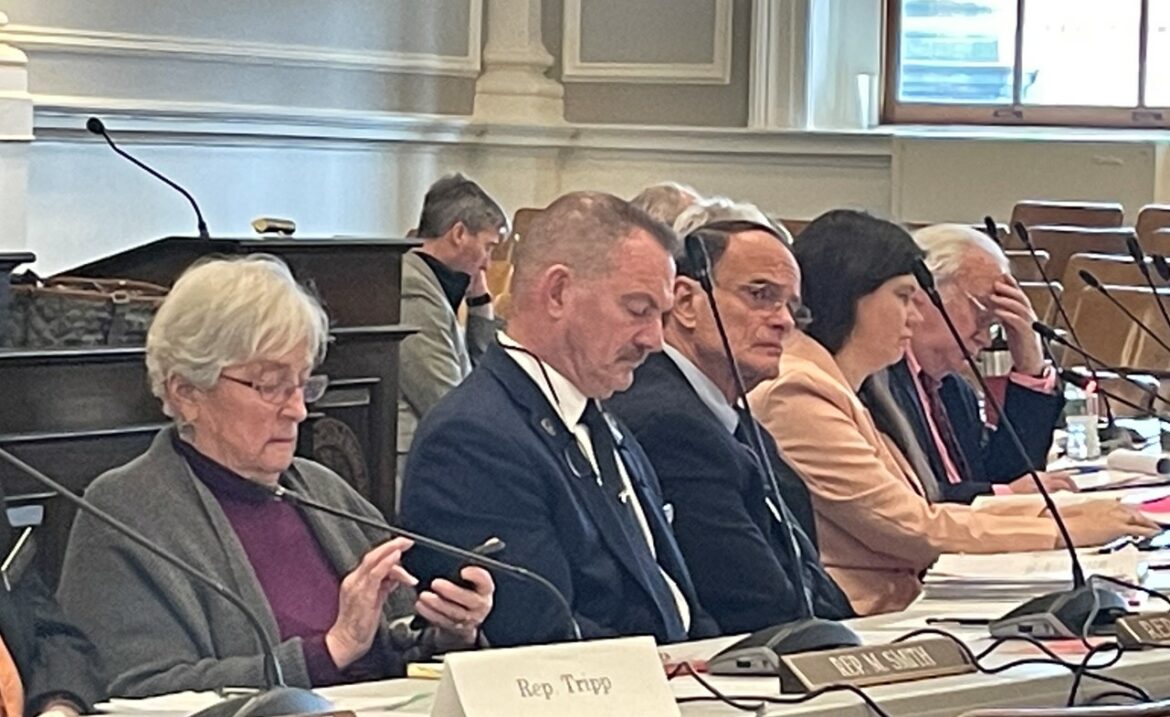By PAULA TRACY, InDepthNH.org
CONCORD – Elimination of the state’s new fetal life protection act, removal of criminal and civil penalties for doctors who perform abortions after 24 weeks, and a bill that would guarantee the unrestricted right to abortion in the Granite State brought impassioned testimony, equally for and against the measures Wednesday.
A fourth bill would affirmatively ensure the right to abortion up to 24 weeks.
On Thursday, the House Judiciary Committee will hear three more bills on the other side of the issue, including one that would restrict abortions after the detection of a heartbeat (at about six weeks) and require doctors to provide medical care to all “born alive” and require a woman to give informed consent before an abortion.
The measures come at an uncertain time for the issue of reproduction rights in the state and nation following the U.S. Supreme Court’s decision to strike down the 50-year-old national right to abortion, Roe v. Wade last summer, leaving the limits and decisions up to the states.
Only a year before that the state put in place its first modern-day abortion ban which now limits the procedure to terminate a pregnancy after 24 weeks, with an amended change to allow for termination for fatal, fetal anomalies. The fetal life protection act holds no exceptions for rape and incest and it states that medical providers who violate the law may be subject to a Class B felony, punishable by seven years in prison.
While New Hampshire polls have shown respondents overwhelmingly support abortion rights, a recent NH Institute of Politics poll found the majority of residents support some abortion restrictions, said Jason Hennessey, president of New Hampshire Right to Life.
“No mother in New Hampshire is required to raise a child,” he told lawmakers Wednesday.
State Rep. Alexis Simpson, D-Exeter, a prime sponsor, said these are scary and uncertain times for many who need to consider if and when to start a family.
Her bill, HB 88, says the state cannot further restrict access to abortion more than the current law, restricting it after 24 weeks of pregnancy.
Another bill heard, CACR 2 would allow voters to decide whether abortion rights should be legal and part of the New Hampshire Constitution. All proposed constitutional amendments need a three-fifths majority of House members present and voting, of Senators and a two-thirds majority of voters at the next general election to change the constitution.
House Bill 271 would repeal the new fetal life protection act limiting abortion after 24 weeks.
House Bill 224 would repeal the criminal and civil penalties for medical care providers who provide abortions after 24 weeks in that act.
The bills, in the House Judiciary, come at a time when the committee and the 400-member House of Representatives is almost equally divided between Republicans and Democrats.
A number of the Republicans in the House now identify as leaning libertarian who may side with reproductive freedom.
But some feel that the current measure, passed in a budget resolution and without hearings, is a good compromise with no limits on abortion until 24 weeks of pregnancy.
Gov. Chris Sununu, a Republican who signed the new fetal life protection law, has said he would not support further restrictions.
A possible Republican presidential candidate, Sununu has maintained that New Hampshire will remain a “pro-choice” state and that he himself is pro-choice, a matter argued by reproductive rights advocates.
What is not clear is if he would support measures that would liberalize the current statutes on abortion here.
The measures brought out about 100 people for a day-long testimony Wednesday in Representatives Hall at the State House with signers on the bills almost equally divided.
It included testimony from two women who had to have late-term abortions, though they said they very much wanted their pregnancies but who found that their fetuses were not viable.
They also heard from state Sen. Rebecca Perkins-Kwoka, D-Portsmouth, who was pregnant and in her late stages when the new law passed and voiced her concerns then and now that she is a mother that reproductive rights here need to be set in law.
The overturning of Roe. v. Wade created a void that needs to be filled here, she said.
“We need to craft a New Hampshire solution before one is placed upon us,” she said.
State Sen. Becky Whitley, D-Hopkinton, noted some states have changed their laws so drastically since the Dobbs decision, including Texas which allows for “bounty hunters” to out women who get abortions.
“In New Hampshire, we do not have a law,” Whitley said, but HB 88 provides clarity in law that abortion is allowed until 24 weeks.
“This bill would make it crystal clear,” she said.
Currently, Whitley said, “we have a void on the books…The only law is a restriction to abortion,” not an affirmative law that abortion is a right until 24 weeks.
The Senate Judiciary Committee had a hearing on a similar provision to HB 88 in SB 181.
It has recommended it be killed by the full Senate, with state Sen. Sharon Carson, R-Londonderry, questioning its necessity during the hearing.
Phyllis Woods of Dover, who said she used to serve as a legislator on the House Judiciary Committee, said if the laws are repealed the state might see an influx of people coming here for late-term abortions.
Repeal of the current law, she said, would be out of the mainstream.
She noted 43 states currently have restrictions at six months or earlier and “we would be the exception” if the measure is repealed.
Woods suggested that all on the committee have common ground in three areas: choice is important, none believe in unrestricted choice, and “we appreciate the sanctity of life.”
Former state Rep. Kurt Wuelper, representing NH Right to Life, said the organization is in total opposition to CACR 2 because “there can be no Constitutional right along these lines. Abortion is the intentional killing of a human being. That cannot be constitutional.”
He said one person – the mother- should not be allowed to make such an impactful decision” without others having input.
Joan Espanola of Londonderry asked for the committee to kill the bill saying the baby has no representation.
“All of you on this committee have the power of life or death,” she said. “Please chose life.”
Bob Dunn, director of public policy for the Catholic Diocese of Manchester opposed CACR 2.
He said proposals that make some people expendable are wrong.
“We need to recognize the human dignity of the human in the womb,” he said.
State Rep. Debra Altschiller, D-Stratham, said citizens want control over their personal and private information.
“This is about control and claiming the right to it,” she said.
She said New Hampshire law recognizes citizens have the right to control their own medical care.
“And yet, when that person is pregnant….the privacy of that information is thrown away,” she said, noting that it is contradictory.
Liz Canada, speaking on behalf of Planned Parenthood of Northern New England supported the measures.
CACR 2 would send the question to the voters and allow the voters to decide.
“It is a very high bar to amend the Constitution,” Canada said. “But we know the great majority of citizens support reproductive freedoms.”
Courtney Reed of the ACLU-NH said abortion should be considered an essential freedom.
The issue of religion was also voiced during the hearings.
Nico Anastasia of Portsmouth said it should ultimately be a woman’s decision to carry a pregnancy or to terminate it.
“Everyone has the right to their own religious beliefs,” he said. “Denying it could have dangerous consequences. It is unfair to women to carry a pregnancy against their will.”
Maggie O’Neill Newmarket, said as a frequent churchgoer of the Episcopal faith, her faith “calls me to hold compassion for others and support the rights of individuals to decide what is right for them.”
“I trust people do make their own decisions,” she said. “I am grateful that I was able to access abortion care when I needed it. These decisions should be left to individuals.”
But Bob Dunn public policy director for the Catholic Diocese of Manchester, quoted from Roe v. Wade noting the court recognized “the state’s important and legitimate interest in life” and said the law in place today is consistent with Roe.
He said it would be inadvisable to go back to a time when there were no limits whatsoever on abortion in the state.
The medical community also weighed in on the bills, particularly House Bill 224 repealing the criminal and civil penalties within the fetal life protection act. The current law allows for fines of up to $100,000 and imprisonment of up to seven years for knowingly performing an abortion in violation of the law.
State Rep. Robert Lynn, R-Windham, and committee chair, said he felt troubled that there would be no penalty.
Rep. Dan Wolf, R-Newbury, said a doctor acting in the best interest of the mother should not be worried about his or her own liberty when seconds to save her life count.
“A doctor acting in good faith would not want to have that sword hanging over his head,” Wolf said.
State Rep. Sue Prentiss, D-Lebanon, said a letter signed by over 200 medical professionals argue that the new law impacts the state’s ability to recruit and retain such professionals at a time when the state is seeing that trained body shrink in size.
“This is not just a rural problem,” she said. Of the 26 acute care hospitals, 10 have closed their birthing units.
“My concern is the pipeline…to take care of mothers and their babies,” Prentiss said.
On Thursday, the House Judiciary Committee will be back at it on the abortion issue beginning at 9 a.m. with House Bill 346, requiring doctors to provide life-saving care for anyone born alive.
At 10:30 a.m. it is scheduled to hear House Bill 562 which would require a woman to give informed consent prior to an abortion and at 1 p.m., House Bill 591 which would prohibit termination of a pregnancy after a fetal heartbeat can be heard.





